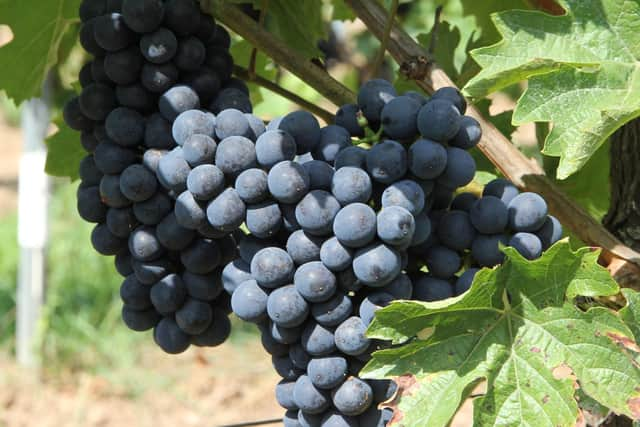Joining a good wine club can be a rewarding experience


There is something about the regular mailshots, the information and, in times gone by, the tastings that make choosing wine easy. Together with their En Primeur offers for Bordeaux, Burgundy and Port, as well as the availability of long-term wine storage in perfect conditions, a good wine club provides a structure to learning about, and enjoying, wine.
Of all the available wine clubs, I can recommend two. The first is the Yorkshire Post Wine Club, which I select the wines for, with the second being the Wine Society. This was established in Victorian times when an excess of wine after the Great Exhibition in 1874 led to a lunch club and a wine-selling operation. Over a century later, the Wine Society, or to give it its full name, the International Exhibition Co-operative Wine Society Ltd, is still in business, with members all over the country.
Advertisement
Hide AdAdvertisement
Hide AdBecause of the way the Wine Society was set up, it is a mail order wine club, but with important differences. The key word in its name is co-operative, which means it acts like a society so you have to pay to join. This costs £40, but it is the best £40 you will ever spend on wine.


For a start, they send you a £20 voucher which brings the membership fee down to just £20, and this doesn’t just last for a year. This is a longer-than-lifetime share in the society since you can bequeath it to your nearest and dearest when you move on to the great vineyard in the sky. I have just invested my own £40 (plus a case of wine) in my future son-in-law. Now he has his own membership of the Wine Society, there is the distinct chance of drinking decent wine when he and our daughter invite us over for dinner.
The other important point is that the Wine Society tries really hard not to make a profit, so in terms of flavour for money, prices are very competitive. It genuinely is a co-operative.
In any wine-retailing operation it is vital to keep the range refreshed and interesting so the Wine Society buyers have been busy, even during lockdown.
Here are 10 new additions and vintages in the range.
Advertisement
Hide AdAdvertisement
Hide AdBlack Chalk Classic 2016 Brut, English Sparkling Wine, £34: Made by Yorkshire-born Jacob Leadley, Black Chalk is a relatively new name on the scene but it is gaining many accolades and medals. This wine is made from Pinot Noir, Pinot Meunier and Chardonnay grown on the chalk hills of Hampshire and fermented using the classic, in-bottle method. Aged on its lees for at least two years, it achieves honeysuckle aromas with a textured palate of white peach and lemon, toasted hazelnuts and a clean-as-a-whistle definition.
Saumur Blanc 2019, “Les Plantagenêts”, Loire, France, £7.95: Delicious, crisp Chenin Blanc with ripe apple fruit, lime zest and a touch of honeyed texture, although the wine is totally dry. This is a wine to enjoy chilled as an aperitif and alongside a salmon terrine or pork tenderloin.
The Society’s English White 2019, Gloucestershire, £8.50: The flowers on the label indicate the English garden aromas, followed by zingy freshness with citrus and a touch of apricot fruit.
The Society’s Greek White 2019, £8.95: There is a lot more to Greek wine than Retsina. This comes from Neméa in the northern part of the Peloponnese and is a blend of the Moschofilero and Roditis grapes. The flavours are crisp, with notes of white blossom, honeysuckle, citrus and a bite of astringency which makes this one to pair with grilled fish, especially if there are olives on the plate.
Advertisement
Hide AdAdvertisement
Hide AdViognier Grès du Trias 2018, Coteaux de l’Ardèche, France, £9.95: Gorgeous peachy, apricot fruit with a hint of spice and gentle acidity makes this a wine to team with creamy chicken or seafood dishes.
Domaines Schlumberger Gewürztraminer 2017, Les Princes Abbés, Alsace, France, £17: There is something about Alsace that is totally captivating. The steep slopes, the Toytown villages and the delicious food that manages to bridge the flavours of French cuisine with the heartiness of German dishes. Family-owned and run, Domaines Schlumberger has cultivated some of the best vineyards in Alsace for over 200 years. This is a gorgeous Gewürztraminer, all rose petals, lychees and spice with a clean streak of acidity across the palate. Try it with duck liver pâté, ginger-spiced tuna or smoked salmon nibbles.
The Society’s Exhibition Malbec Mendoza 2018, Argentina, £10.95: Dark chunky mulberry fruit edged with spice and with enough backbone to stand up to a serious steak. This is a well-structured Malbec that will develop and fill out with age.
Spätburgunder, Markgräferland 2017, Martin Wassmer, Baden, Germany, £13.50: If the long grape name with the umlaut is offputting just think Pinot Noir – and this is a delicious one, from the sunny, southern region of Baden. Packed full of ripe fresh cherry fruit with clean, fresh acidity and oak almost hidden.
Advertisement
Hide AdAdvertisement
Hide AdDomaine de Brésèyme Rouge 2016, Côtes du Rhône, France, £21: This is a high price to pay for an ordinary Côtes du Rhone, but this wine is anything but ordinary. This four-hectare vineyard, just south of Crozes Hermitage has been bought by Nicolas Jaboulet. The wine is 100 per cent Syrah, deep with bramble fruit and pepper, concentrated and precise. Glorious.
Shaw and Smith Adelaide Hills Shiraz 2016, Australia, £25: From a region better known for its Pinots and Chardonnays, this Shiraz is remarkable. The cool climate with clear sunshine brings out a Northern Rhône character, with lifted mulberry and crunchy raspberry fruit and a distinct twist of black pepper. Buy at least two bottles, one to drink now and one to keep. I have tasted older vintages and they age tremendously well.
Editor’s note: first and foremost - and rarely have I written down these words with more sincerity - I hope this finds you well.
Almost certainly you are here because you value the quality and the integrity of the journalism produced by The Yorkshire Post’s journalists - almost all of which live alongside you in Yorkshire, spending the wages they earn with Yorkshire businesses - who last year took this title to the industry watchdog’s Most Trusted Newspaper in Britain accolade.
Advertisement
Hide AdAdvertisement
Hide AdAnd that is why I must make an urgent request of you: as advertising revenue declines, your support becomes evermore crucial to the maintenance of the journalistic standards expected of The Yorkshire Post. If you can, safely, please buy a paper or take up a subscription. We want to continue to make you proud of Yorkshire’s National Newspaper but we are going to need your help.
Postal subscription copies can be ordered by calling 0330 4030066 or by emailing [email protected]. Vouchers, to be exchanged at retail sales outlets - our newsagents need you, too - can be subscribed to by contacting subscriptions on 0330 1235950 or by visiting www.localsubsplus.co.uk where you should select The Yorkshire Post from the list of titles available.
If you want to help right now, download our tablet app from the App / Play Stores. Every contribution you make helps to provide this county with the best regional journalism in the country.
Sincerely. Thank you.
James Mitchinson
Editor
Comment Guidelines
National World encourages reader discussion on our stories. User feedback, insights and back-and-forth exchanges add a rich layer of context to reporting. Please review our Community Guidelines before commenting.